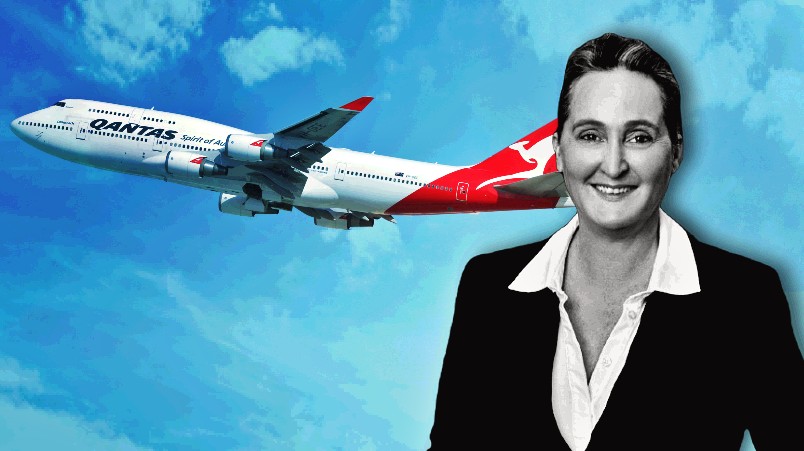Customers, hackers and disintermediation are big long-term risks for Qantas as the Flying Kangaroo makes big investments in CX and digital transformation designed to leave behind the gloomy brand decay of Alan Joyce's final years

Qantas's new chief Vanessa Hudson, as Alan Joyce's Group CFO owns his decisions. But she is clearly more focused on the customer outcome, and that's starting to pay dividends in NPS. In theory the profits will follow.
Qantas is investing heavily in customer experience and digital transformation as it looks to rebuild its brand cachet, savaged during the early years of the decade by Covid, and smashed by the airline's poor performance after the economy reopened. The fact that the former CEO, Alan Joyce, blamed customers for poor customer experiences didn't help. New boss and former Group CFO, and chief customer officer, Vanessa Hudson, seems to be off to a better start at least on the service front, with NPS rising in late 2023, and customer satisfaction scores rebounding after Xmas. However, the airline still reported falling profits for H1, despite a very strong performance by the Loyalty Group, which helped the Flying Kangaroo generate marketing revenues of $533 million, up $140 million on the corresponding half last year. Unhappy customers pose a big risk for the airline, as does the threat of cybercrime, and the emergence of new business models, according to the company's financial filings. And there is one big short-term risk: The ACCC's legal action accusing Qantas of the kind of slippery misconduct that reinforces consumer prejudice against brands already on the nose — selling tickets on flights it had already cancelled.
What you need to know
- Six months into her tenure as Qantas CEO, and despite a decline in profitability, Vanessa Hudson had some good news to share in its latest half-year financial results, including an improved NPS in the final quarter of 2023, her first full quarter in charge. Customer satisfaction scores are also on the rise.
- But there is a lot of ground to catch up for a brand that was Australia's strongest in 2019 - per Brand Finance - but which got smacked by the Covid shutdown and fell to 7th in 2022. Worse, the company's poor operational performance after the economy reopened generated a reputational hit that saw it sink to 41st this year - down 22 places in the last 12 months.
- Alan Joyce left in early September, snapping up a $2.2 million performance bonus in the deep-freeze even as the ACCC sues Qantas for allegedly selling tickets on flights it had already cancelled. Joyce was replaced by Hudson, a 30-year veteran of the airline but executive who has looked to recalibrate its strategy on a number of fronts.
- The new boss is already investing in better customer experiences, voice of the customer programs and other digital initiatives, along with upgrades to the fleet, as she manages customer risk. She's also keeping a watchful eye on the emergence of new business models that threaten incumbents with disintermediation, and cyber threats that could set the business back on its heals should it experience and Optus or Medibank scale breach.
- But while data may be asbestos, it's also high-performance jet fuel for the airline, as the strong results at Qantas Loyalty attest.
We know that millions of Australians rely on us and we’ve heard their feedback loud and clear. There’s a lot of work happening to lift our service levels and the early signs are really positive. Our customer satisfaction scores have bounced back strongly since December and we have more service and product improvements in the pipeline.
Of all the strategic risks Qantas faces as it looks to rebuild trust in its brand, perhaps the most remarkable are the customers themselves.
The company itself made the point in its H1 FY2025 financial report last week, saying "The ongoing success of the Qantas Group depends to a large degree on customer satisfaction and loyalty, particularly considering the significant competition for passengers that characterises the aviation industry."
It's a point not lost on Qantas CEO Vanessa Hudson either. Hudson, a three-decade veteran of the group, was previously the Group CFO (and who therefore arguably shares in many of Qantas's missteps as much as her former boss).
According to Hudson, "We know that millions of Australians rely on us and we’ve heard their feedback loud and clear. There’s a lot of work happening to lift our service levels and the early signs are really positive. Our customer satisfaction scores have bounced back strongly since December and we have more service and product improvements in the pipeline."
It helps Qantas is investing in listening more. It has developed a new 'Voice of Customer' app and said staff are now more empowered at the frontline to make decisions.
Also noted in the financial report are new initiatives targeting customer “pain points” including a better flying experience, better digital interactions, faster recovery when things don’t go to plan, and rewarding customers for their loyalty.
"Investments in operational reliability including additional spare aircraft and a focus on fleet health have improved on-time performance," the report stated.
These changes, along with the launch of a new Qantas App with baggage tracking and upgrades to food and beverage offerings, all supported a a rise in Net Promoter Scores (NPS) in the final quarter of last year - Hudson's first full quarter in charge.
Qantas's First Half report additionally outlined several significant investments in digital experience as part of what it describes as "a major revamp across digital channels with an ongoing rollout of improvements designed to make it easier for customers to manage their travel on the ground, including during disruptions." These include:
- A major evolution of the Qantas app to deliver more functions including enhanced baggage tracking, flight tracking, and improved status updates during disruptions, along with updates on customer inquiries.
- A complete overhaul of qantas.com from mid-2024, making it significantly faster and easier to use.
- For Jetstar, there's online check-in for international flights enabling a quicker and more efficient experience through the airport, and a new app, providing a better service with live notifications of gate or flight updates.
Qantas is also following the lead of overseas rivals like Delta, and upgrading to free inflight Wi-Fi for international travellers. According to the company, it will retrofit its existing fleet of international aircraft with fast and free Wi-Fi, with the service progressively switched on from the end of 2024.
"The expansion of Wi-Fi to the airline’s international fleet was deferred until global satellite technology was able to deliver a similar quality connection that Qantas customers have when travelling domestically. The speed and reliability of Qantas’ domestic Wi-Fi service has driven average take-up rates of 75 per cent, with some routes showing up to 100 per cent uptake. Qantas will offer ‘fast and free’ international Wi-Fi with enough bandwidth for every passenger to enjoy a fast and consistent connection," the report stated.
It is also moving to clean up the issue of Covid credits. The company said that from next month, Qantas will trial proactive refunds to customers still holding COVID credits. "Qantas has worked with banking partners to establish a new process that means the airline can now trial proactive refunds with a safeguard in place if the original payment method (typically, a credit card) is no longer valid. While a large percentage of credit cards have likely expired, this new mechanism makes it a more practical refund option to try."
A bat, a pangolin and a kangaroo walk into a bar
Qantas's brand has taken a belting in recent years. Brand Finance identified it as Australia's strongest brand in 2019. By 2022, after the ravages of Covid it had fallen to 7th. But the reopening of the economy didn't help. Instead, terrible customer experiences at the airports - which the former CEO blamed on the customers themselves - exposed the folly of Joyce's slash-and-burn approach to staffing (despite stiffing taxpayers for $900 million in JobKeeper funds). By 2023, if had fallen out of the top 10 altogether and now languishes at 41st.
While Qantas climbed one ranking place in terms of brand value to 17th in the latest rankings released earlier this year, Brand Finance calculated its brand value actually declined 7.4 per cent, or by $224m. Brand strength fell similarly, taking it from 17th in 2023 to 41st place.
Brand Finance managing director Mark Crowe last year predicted an incoming financial hit for the carrier based on its falling brand strength score – and he suggested further business impacts given an 11 per cent brand strength fall over two years.
“That’s very significant … certainly when you're looking at the attributes where they've been impacted, it's all very much around reputation, value for money, trust, consideration, " he told Mi3 in January.
Risks from data, disintermediation
Given the hits the brand has taken - contrasted with the success of Qantas Loyalty, which you'll see below - the last thing Qantas needs is an Optus/Medibank-style cyber incident and data loss.
And cybersecurity tends to top the risk registry at most large enterprises. In its financial report, Qantas said the heightened cyber threat environment continues to evolve, with increased cyber-criminal activities targeting organisations capable of paying ransoms.
"As cyber breaches and attacks surge globally and hybrid ways of working continue, the Qantas Group, through its Cyber Strategic Road Map and utilising learnings from analysis of cyber incidents in other organisations, continues its proactive response to external and internal threats," the report stated.
The airline is alive to the threat posed by new business models too, reporting, "As more large customer brands aim for a seamless customer journey, the threat of further airline disintermediation, the rapid rise of digitalisation and new technology and business models continue to evolve. The Group continues to enhance its distribution strategy and digital capability, expand its coalition business through innovative new business models, new partners, and member experience, and invest in technological platforms and processes to enable a significantly improved end-to-end customer journey."
There is also a more immediate risk, and it’s not the kind to make it into a happy, shiny customer experience media release.
In the contingent liabilities section of its financial report, Qantas noted that in August last year, the Australian Competition and Consumer Commission (ACCC) sued Qantas for breaches of the Australian Consumer Law in the continued sale of services after specific flights had been cancelled. The action marked the last major controversy of the troubled tenure of former CEO Alan Joyce, who resigned from the role in early September, ahead of his expected departure.
“The proceedings, if not resolved beforehand, are expected to be heard in late calendar year 2024," Qantas stated. "In September 2023, the High Court dismissed the Group's appeal from the lower courts' decisions in the below-the-wing outsourcing adverse action proceedings. In March 2024, the compensation hearing for affected ex-employees will be heard by the Federal Court, with judgement likely to follow shortly afterwards.”
If the airline loses, it will prove especially costly for Joyce, the $21 million man. He will forfeit a $2.2m short-term bonus, and as much as $14m in other payments could be clawed back for various reasons, according to the board.
Qantas Loyalty expanded significantly during the half, adding more members to reach 15.8 million and adding several major program partners.
Broadening Loyalty sales
One universally positive aspect of Qantas' latest report is the performance of Qantas Loyalty. According to the company, Qantas Loyalty expanded significantly during the half, adding more members to reach 15.8 million and adding several major program partners. Value of bookings via Qantas Hotels and Holidays increased by around 30 per cent compared with 1H23. TripADeal bookings grew by more than 60 per cent.
While brand decay and poor experiences may have hurt the core bums-on-seats business in recent years, Qantas Loyalty seems to be somewhat immune. It was able to increase the number of Qantas-branded home and motor insurance policies by a factor of 2.5 times compared with 1H23, "...and financial services continued to grow, with more than 100,000 credit card acquisitions during the half and a 4 per cent increase in the value of purchases on cards earning Qantas Points," the report stated.
The company is also proving adept at leveraging all the valuable data held by the loyalty group with Qantas Loyalty helping to generate marketing revenues of $533 million, up $140 million on the corresponding half last year. Overall underlying EBIT at Qantas Loyalty grew to $270 million, up 23 per cent on last year's H1. The strong performance in calendar 2023 meant Loyalty achieved its earnings target of $500 million per annum six months ahead of schedule.
And Qantas flagged upcoming improvements to the Frequent Flyer program which is expected to announce in April this year.
Cheaper bums on better seats
On a final note, Hudson addressed cost and capacity during this year's financial presentations. “We understand the importance of affordable air travel and more capacity in the market means fares have fallen more than 10 per cent since peaking in late 2022," she said.
"In the first six months of this year, Jetstar is adding more than 400,000 seats across its network to help meet strong demand from people wanting to take a well-earned break as they also deal with cost of living pressures.
“We’re investing heavily in new aircraft that are a step-change from the technology they replace. They have more comfortable cabins and can fly further, opening up a lot of new routes domestically and overseas. These next-generation aircraft are up to 50 per cent quieter and generate 20 per cent less carbon emissions. We’re already seeing a significant benefit from lower fuel burn, which helps put downward pressure on fares given it’s our biggest single cost."


